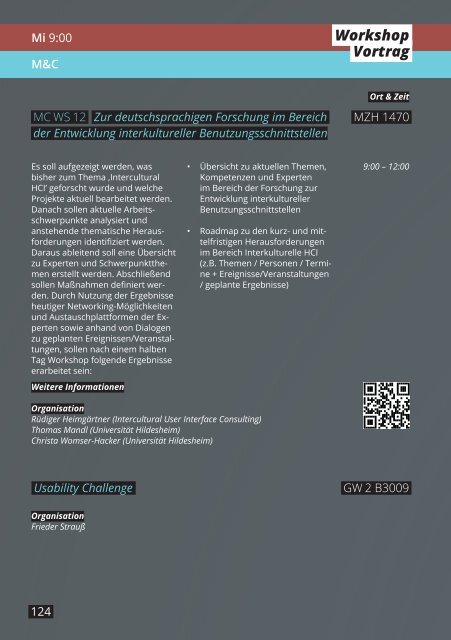PDF Programmheft - Mensch & Computer
PDF Programmheft - Mensch & Computer
PDF Programmheft - Mensch & Computer
Sie wollen auch ein ePaper? Erhöhen Sie die Reichweite Ihrer Titel.
YUMPU macht aus Druck-PDFs automatisch weboptimierte ePaper, die Google liebt.
Mi 9:00<br />
M&C<br />
Workshop<br />
Vortrag<br />
Session<br />
Kooperative Systeme<br />
Mi 9:00<br />
M&C<br />
Ort & Zeit<br />
Ort & Zeit<br />
MC WS 12 Zur deutschsprachigen Forschung im Bereich<br />
der Entwicklung interkultureller Benutzungsschnittstellen<br />
MZH 1470<br />
GW 2 B3010<br />
MC SE 07 User Tracking for Collaboration on<br />
Interactive Wall-Sized Displays<br />
Es soll aufgezeigt werden, was<br />
bisher zum Thema ‚Intercultural<br />
HCI’ geforscht wurde und welche<br />
Projekte aktuell bearbeitet werden.<br />
Danach sollen aktuelle Arbeitsschwerpunkte<br />
analysiert und<br />
anstehende thematische Herausforderungen<br />
identifiziert werden.<br />
Daraus ableitend soll eine Übersicht<br />
zu Experten und Schwerpunktthemen<br />
erstellt werden. Abschließend<br />
sollen Maßnahmen definiert werden.<br />
Durch Nutzung der Ergebnisse<br />
heutiger Networking-Möglichkeiten<br />
und Austauschplattformen der Experten<br />
sowie anhand von Dialogen<br />
zu geplanten Ereignissen/Veranstaltungen,<br />
sollen nach einem halben<br />
Tag Workshop folgende Ergebnisse<br />
erarbeitet sein:<br />
• Übersicht zu aktuellen Themen,<br />
Kompetenzen und Experten<br />
im Bereich der Forschung zur<br />
Entwicklung interkultureller<br />
Benutzungsschnittstellen<br />
• Roadmap zu den kurz- und mittelfristigen<br />
Herausforderungen<br />
im Bereich Interkulturelle HCI<br />
(z.B. Themen / Personen / Termine<br />
+ Ereignisse/Veranstaltungen<br />
/ geplante Ergebnisse)<br />
9:00 – 12:00<br />
9:00 – 9:30<br />
Chair<br />
Tom Gross<br />
To support collaboration on<br />
wall-sized interactive displays we<br />
developed a system that is capable<br />
of distinguishing multiple users collaboratively<br />
interacting with a large<br />
surface at the same time. In order<br />
to allow for seamless switches between<br />
different modes of collaboration,<br />
the system uses camera based<br />
tracking that requires no additional<br />
hardware. The system also allows<br />
for exploiting the position of a user<br />
in front of the screen in order to<br />
show information about the users’<br />
AutorInnen<br />
Moritz Wiechers, Alexander Nolte, Michael Ksoll,<br />
Thomas Herrmann, Andrea Kienle<br />
context directly in front of them.<br />
This information could e.g. indicate<br />
which item is currently used by<br />
whom during a collaborative session,<br />
so that all participants can coordinate<br />
their actions. We present a<br />
study in which we assess the quality<br />
of the distinction mechanism, show<br />
possibilities for improvement and<br />
describe how awareness of the<br />
actions of others could enhance<br />
collaboration.<br />
Weitere Informationen<br />
Organisation<br />
Rüdiger Heimgärtner (Intercultural User Interface Consulting)<br />
Thomas Mandl (Universität Hildesheim)<br />
Christa Womser-Hacker (Universität Hildesheim)<br />
Usability Challenge<br />
Organisation<br />
Frieder Strauß<br />
GW 2 B3009<br />
GW 2 B3010<br />
9:30 – 10:00<br />
Chair<br />
Tom Gross<br />
In this paper we present our perspective<br />
on the role of playfulness<br />
regarding large scale, interactive<br />
floor projections in urban public<br />
space. We start with a model to<br />
identify the key elements and<br />
their interplay within this experience<br />
design space. This model will<br />
develop a deeper understanding of<br />
the design space in order to act as<br />
MC SE 07 Urban Playfulness:<br />
Fostering Social Interaction In Public Space<br />
being a conceptual tool for creating<br />
interactive projects. We discuss<br />
the potential of playful projects to<br />
reconfigure public space in terms of<br />
the performative and motivational<br />
aspects of play. We conclude with<br />
our findings from observing playful<br />
projects built or supported by our<br />
research team.<br />
AutorInnen<br />
Thomas Wagner<br />
Robert Praxmarer<br />
124 125


